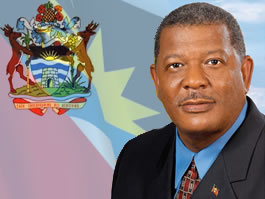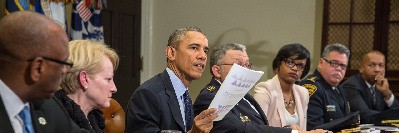Prime Minister applauds President Obama’s commitment to attend UN Climate Change Summit
ST. John’s, Antigua – Prime Minister, Spencer today welcomed the announcement by US President Barack Obama that he will attend the UN Climate Change Summit, to be held at Copenhagen, Denmark from December 7-18; the goal of the Summit is to reach an agreement on a key global treaty to stop global warming and it has been billed as the world’s last chance to stop temperature rise going above 2 C (3.6 F).
President Obama, who has made climate change one of his top legislative priorities for 2009, and who will be receiving the 2009 Nobel Peace Prize in Oslo, Norway on December 10, said that he thinks a deal can still be done and he will go to Denmark a week later to make sure it happens.
“I am confident that all of the countries involved are bargaining in good faith and we are on the brink of a meaningful agreement and if my presence in Copenhagen will make a difference in tipping us over the edge then certainly that’s something that I will do,” he told Reuters.

Hon. Prime Minister Spencer
Prime Minister Spencer, who has been monitoring the talks closely, welcomed President Obama’s confirmation and noted that despite the difficulty Obama faces to sign-up to legally-binding emission targets until the level of cuts have been approved by the US Senate, a commitment by the US President to participate in this crucial meeting gives a boost to the talks that almost ended in deadlock last week in Barcelona, after the US and other rich countries refused to cut their greenhouse gas emissions in line with the poor world’s demands.
“Whereas most countries would and still prefer a legally binding agreement in Copenhagen, we also recognized that this may not be possible in the short time available. Hence, we remain open to some sort of “framework” agreement that commits the world to tackling global warming. Such a framework would have to contain a set of principles, building blocks, that allows for ongoing and continuing progress towards a tough enough target eventually,” the Prime Minister said.
It is now thought that the Copenhagen meeting will become a “leaders’ summit” where the world will make a “political agreement” on cutting emissions before thrashing out targets and a legal treaty later in the year. It will cap a flurry of diplomatic efforts that are now underway aimed at ensuring the Summit is a success. These include talks between the US and Chinese leaders during an Asia tour later this month that will be crucial in agreeing on carbon emission targets and the amount of money rich countries are willing to pay the poor world to help them cut emissions.
Prior to President Obama’s announcement, some 40 heads of States and government had signaled their attendance, including Gordon Brown of the UK, France’s President Nicolas Sarkozy and Brazilian President Lula Inacio da Silva; Germany’s Angela Merkel is yet to commit as are Hu Jintao of China and India’s Manmohan Singh. Now that President Obama has confirmed that he will be attending, it is expected that the leaders of most if not all of the 192 countries who are parties to the climate change convention, will be in Copenhagen.
Antigua and Barbuda plays a key role in the negotiations. The country’s UN Ambassador Dr. John W. Ashe chairs the negotiations on defining a second commitment period for the Kyoto Protocol, in which the industrialized countries take on legally binding emission reductions target. The current commitment period ends in 2012.
Ambassador Ashe noted that the key element to any deal is for the United States and China, the two largest emitters in the world, to be able to come up with a framework that, along with other big emitters like the Europeans and those countries that are projected to be large emitters in the future, like India, can all buy into.
“At the final round of negotiations in Barcelona that ended last week, the United States was universally seen as the linchpin to a political deal, but it has been unable to present its position or pledge emissions targets because of the slow progress of climate legislation in Congress. And despite the likelihood that there will be no final action in the US Congress before the Copenhagen meeting, there is no reason why the major outstanding issues cannot be resolved at Copenhagen,” Ambassador Ashe said.




